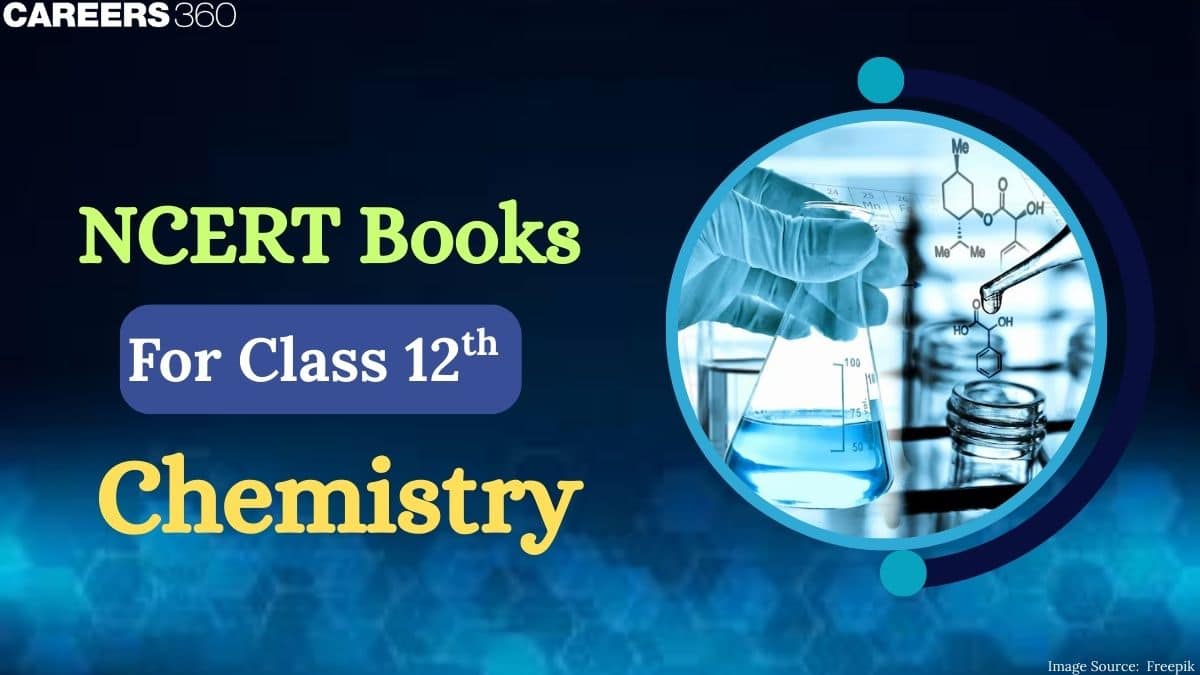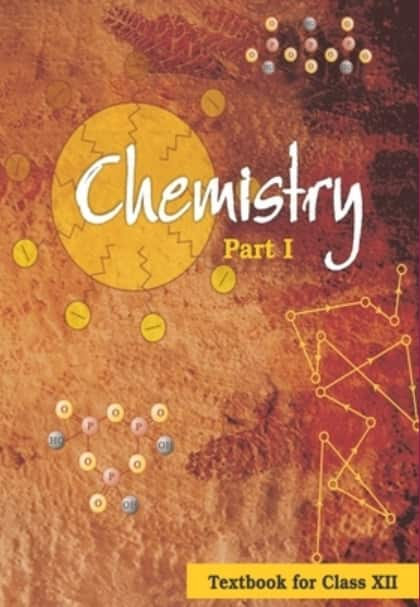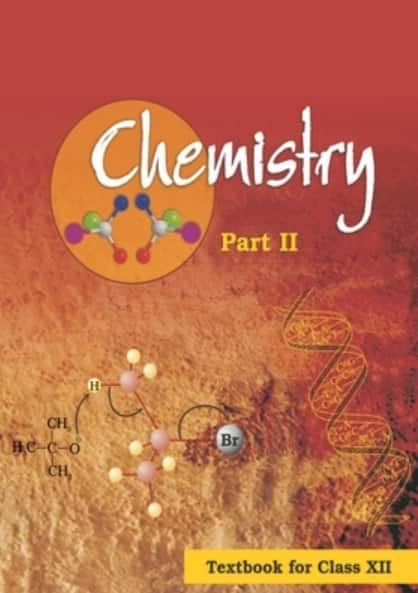NCERT Books for Class 12 Chemistry (PDF Download) – Latest Edition
The NCERT Books for Class 12 Chemistry are one of the most important source for students preparing for boards and competitive exams. This book explains every concept with the help of solved examples, diagrams and end chapter exercises. Chemistry is everywhere around us; from cooking food to powering rockets, it helps us understand the invisible changes that shape our world. The NCERT chemistry class 12 books are a blend of theory and practical that covers important chapters like electrochemistry, chemical kinetics, coordination compounds, d- and f-block elements, biomolecules, etc. Students can download this book from the official website of NCERT.
This Story also Contains
- Download NCERT Books for Class 12 Chemistry PDF 2026
- NCERT Books for Class 12 Chemistry 2026 (Chapter-wise)
- Excluded Chapters in the 2026 Edition
- How to Download NCERT Books for Class 12 Chemistry 2026 PDF for Free?
- Best Reference Books for NCERT Class 12 Chemistry 2026
- How to prepare using the NCERT Book for Class 12 Chemistry
- NCERT Solutions Class 12 Chemistry Chapter-wise
- NCERT Books for Class 12 Subject-Wise

The NCERT Books for Class 12 are a blessing for the students who are eager to learn these amazing reactions and processes. These NCERT books will give you the reason behind everyday phenomena and life processes like interactions of medicines with the body, formation of complex organic compounds, generation of electricity from chemical reactions, etc. The steps to download the books are provided in this article. Students can also access NCERT Solutions for a better understanding of the topics.
Download NCERT Books for Class 12 Chemistry PDF 2026
The NCERT Chemistry book for Class 12 is an important resource for board and competitive exams preparation. With clear explanations, solved examples, and exercises, it helps students strengthen their concepts. Students can easily download the latest 2026 edition in PDF format and study anytime, anywhere.
| Book title | Download link |
|---|---|
| NCERT Book for Class 12 Chemistry Part 1 (English medium) | Click here |
| NCERT Book for Class 12 Chemistry Part 1 (Hindi medium) | Click here |
| NCERT Book for Class 12 Chemistry Part 2 (English medium) | Click here |
| NCERT Book for Class 12 Chemistry Part 2 (Hindi medium) | Click here |
NCERT Books for Class 12 Chemistry 2026 (Chapter-wise)
Students can refer to the table below to get the Chemistry Class 12 chapter-wise PDF. The textbook is divided into two parts, with each part containing five chapters, offering a systematic presentation. Here you can find chapter-wise PDFs of the Class 12 Chemistry NCERT book for the 2026 session. This makes it easy for students to download and study one chapter at a time without carrying the whole book. It also helps in quick revision and better focus on important topics before exams.
Excluded Chapters in the 2026 Edition
The following chapters have been removed from the NCERT Books for Class 12 Chemistry 2026 to make the learning process easy:
- Surface Chemistry
- General Principles and Processes of Isolation of Elements
- The p-block Elements
- The Solid State
- Chemistry in Everyday Life
How to Download NCERT Books for Class 12 Chemistry 2026 PDF for Free?
Download Class 12 Chemistry NCERT Book 2026 PDF by following the steps given below. These Books are officially released by NCERT and can be easily downloaded in PDF format.
- Visit the official website of NCERT at ncert.nic.in.
- Search "Textbook" in the search bar on the upper right-hand side of the site.
- "Textbooks PDF (I-XII)" will show up. Click on this.
- In the "Select class" dropdown, choose 'Class XII' nd in the "Select Subject" drop-down select "Chemistry"
- Now, you are supposed to choose the name of the book.
- Click on the “Go” button.
- A list of chapters will appear, and you can download the individual chapters in PDF format.
- Click on the chapter-wise links and download the NCERT Books for Class 12 Chemistry 2026 PDF for each chapter separately
- Once downloaded, you can access the textbook offline anytime for easy reference and study
NCERT Books for Class 12 Chemistry Part 1: Cover Page

NCERT Books for Class 12 Chemistry Part 2: Cover Page
Best Reference Books for NCERT Class 12 Chemistry 2026
The NCERT books are essential for CBSE board preparation, but referring to additional books can greatly enhance your understanding and improve problem-solving skills. Reference books provide in-depth explanations, extra practice questions, and valuable information for competitive exam preparation. You can also take help from the NCERT notes for class 12 chemistry for better learning.
Here are some highly recommended reference books for class 12 chemistry:
Pradeep’s Chemistry
OP Tandon
Xam Idea
All-in-One Chemistry
For Competitive exam preparation like JEE/NEET
| Physical Chemistry | Organic Chemistry | Inorganic Chemistry |
|---|---|---|
| Physical Chemistry by O.P. Tandon | Organic Chemistry by O.P. Tandon | Concise Inorganic Chemistry by J.D. Lee |
| Physical Chemistry by R.C. Mukherjee | Advanced Problems in Organic Chemistry by M.S. Chouhan | Inorganic Chemistry by V.K. Jaiswal |
How to prepare using the NCERT Book for Class 12 Chemistry
The NCERT Class 12 Chemistry book is the most important source to develop a strong foundation and score good marks in both board and competitive exams. Given below are some tips for using this book effectively:
- Start by reading every chapter thoroughly and underline the important points, reactions, mechanisms and examples.
- Now solve all in-text and end-of-chapter questions, as they are often asked in both boards and competitive exams.
- Make summary notes of important points, reactions, mechanisms, and examples, as they will be very helpful for exam times.
- Revise concepts regularly with the help of notes.
NCERT Solutions Class 12 Chemistry Chapter-wise
The links in the table below will take you to the chapter-wise NCERT solutions for 12th Chemistry. The questions provided in the textbook are very important for practice. Solving them regularly enhances understanding and conceptual clarity.
NCERT Books for Class 12 Subject-Wise
The links to the NCERT class 12 books are given below.
Frequently Asked Questions (FAQs)
NCERT Books for Class 12 Chemistry 2026 are highly recommended as they are aligned with the CBSE syllabus. They cover fundamental concepts, provide clear explanations, and include practice questions, making them ideal for exam preparation.
NCERT chemistry class 12 books provide a solid foundation in Chemistry, which is essential for various competitive exams like JEE, NEET, etc. Many concepts and topics in these entrance exams are directly sourced from the NCERT.
NCERT Chemistry book for Class 12 are revised periodically to reflect the latest educational standards and scientific advancements. Any changes in curriculum or syllabus by the CBSE are usually incorporated in the new editions.
Using NCERT Books for Class 12 Chemistry is important because they are designed specifically to help students systematically understand the concepts. These books cover the syllabus comprehensively and are often referred to for board exams, making them essential for effective exam preparation.
Some important topics covered in NCERT Books for Class 12 Chemistry are
- Solutions
- Electrochemistry
- Chemical Kinetics
- Coordination Compounds
- Haloalkanes and Haloarenes
NCERT books are the official textbooks used in Indian schools for various subjects, including Chemistry for Class 12. These books are designed to provide comprehensive coverage of the syllabus defined by the Central Board of Secondary Education.
Yes, NCERT Class 12 Chemistry book is available for free in PDF format on the official NCERT website.
The NCERT Books for Class 12 Chemistry are very helpful, as they explain complex topics in simple language with clear diagrams and examples. They follow the updated syllabus and help students build strong concepts for board exams and competitive tests like NEET and JEE.
You can download the NCERT Chemistry Class 12 PDF for free by visiting the official NCERT website or other educational platforms that provide government-approved resources.
Yes, NCERT Chemistry books are generally considered sufficient for exam preparation, especially for the CBSE board exams.
Popular Questions
Courses After 12th
Applications for Admissions are open.
As per latest syllabus. Physics formulas, equations, & laws of class 11 & 12th chapters
JEE Main Important Chemistry formulas
Get nowAs per latest syllabus. Chemistry formulas, equations, & laws of class 11 & 12th chapters
JEE Main high scoring chapters and topics
Get nowAs per latest 2024 syllabus. Study 40% syllabus and score upto 100% marks in JEE
JEE Main Important Mathematics Formulas
Get nowAs per latest syllabus. Maths formulas, equations, & theorems of class 11 & 12th chapters

